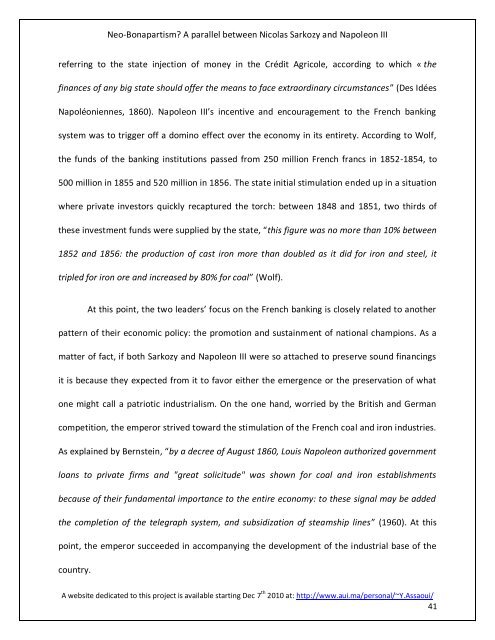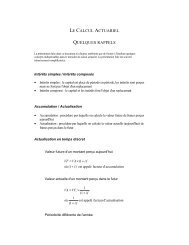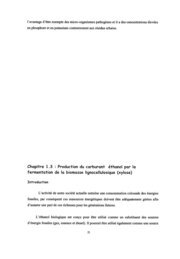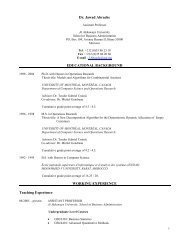Neo-Bonapartism? A parallel between Nicolas Sarkozy and ...
Neo-Bonapartism? A parallel between Nicolas Sarkozy and ...
Neo-Bonapartism? A parallel between Nicolas Sarkozy and ...
You also want an ePaper? Increase the reach of your titles
YUMPU automatically turns print PDFs into web optimized ePapers that Google loves.
<strong>Neo</strong>-<strong>Bonapartism</strong>? A <strong>parallel</strong> <strong>between</strong> <strong>Nicolas</strong> <strong>Sarkozy</strong> <strong>and</strong> Napoleon III<br />
referring to the state injection of money in the Crédit Agricole, according to which « the<br />
finances of any big state should offer the means to face extraordinary circumstances” (Des Idées<br />
Napoléoniennes, 1860). Napoleon III’s incentive <strong>and</strong> encouragement to the French banking<br />
system was to trigger off a domino effect over the economy in its entirety. According to Wolf,<br />
the funds of the banking institutions passed from 250 million French francs in 1852-1854, to<br />
500 million in 1855 <strong>and</strong> 520 million in 1856. The state initial stimulation ended up in a situation<br />
where private investors quickly recaptured the torch: <strong>between</strong> 1848 <strong>and</strong> 1851, two thirds of<br />
these investment funds were supplied by the state, “this figure was no more than 10% <strong>between</strong><br />
1852 <strong>and</strong> 1856: the production of cast iron more than doubled as it did for iron <strong>and</strong> steel, it<br />
tripled for iron ore <strong>and</strong> increased by 80% for coal” (Wolf).<br />
At this point, the two leaders’ focus on the French banking is closely related to another<br />
pattern of their economic policy: the promotion <strong>and</strong> sustainment of national champions. As a<br />
matter of fact, if both <strong>Sarkozy</strong> <strong>and</strong> Napoleon III were so attached to preserve sound financings<br />
it is because they expected from it to favor either the emergence or the preservation of what<br />
one might call a patriotic industrialism. On the one h<strong>and</strong>, worried by the British <strong>and</strong> German<br />
competition, the emperor strived toward the stimulation of the French coal <strong>and</strong> iron industries.<br />
As explained by Bernstein, “by a decree of August 1860, Louis Napoleon authorized government<br />
loans to private firms <strong>and</strong> "great solicitude" was shown for coal <strong>and</strong> iron establishments<br />
because of their fundamental importance to the entire economy: to these signal may be added<br />
the completion of the telegraph system, <strong>and</strong> subsidization of steamship lines” (1960). At this<br />
point, the emperor succeeded in accompanying the development of the industrial base of the<br />
country.<br />
A website dedicated to this project is available starting Dec 7 th 2010 at: http://www.aui.ma/personal/~Y.Assaoui/<br />
41

















